Official Warns Population Growth Rate Fast Declining In Iran
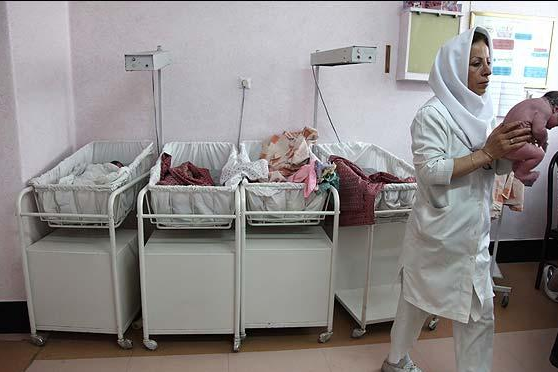
An official has said that Iran has now the lowest birth rate in the Middle East after experiencing the fastest decline in births during the past three decades.

An official has said that Iran has now the lowest birth rate in the Middle East after experiencing the fastest decline in births during the past three decades.
Saleh Ghasemi, head of the Center for Strategic Research on Population told a local news agency that the current birth rate is 1.6 for each woman at the age of fertility. He added that in mid-1980s Iran had a 6.5 birth rate, one the highest in the world, but it has been declining since.
Ghasemi put Iran’s population at more than 85 million, although some believe that this figure includes a few million Iranians who have left the country but are still counted as residents. He added that the population growth rate is currently 0.6 percent but is expected to decline to zero in the next 10-15 years.
Iran’s declining rate of population growth has been a hot political topic in the country, where its Supreme Leader Ali Khamenei and senior clerics in the religious political system have been calling for policies to boost population.
Ghasemi said that the biggest decline in births took place between 2015-2020, when there were 550,000 fewer births annually. He went on to say that women born in the 1980s are dropping out of the child-bearing age. This, coupled with change in people’s preferences and lifestyle will continue to reduce births.
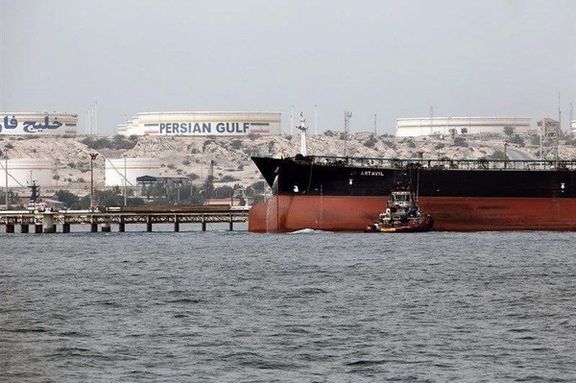
Contradicting trade officials, the IRGC-linked Fars news agency has once again insisted that Iran is selling more than a million barrels p/d of oil to China.
In a report Sunday, Fars accused officials of the Tehran Chamber of Commerce of wrongfully declaring that Iran's crude oil exports to China have dropped to around 1,000 bpd, because they are allegedly opposed to "neutralization of [US] oil sanctions". Fars also accused the chamber of sabotaging Iran's relations with China.
In a tweet Saturday, Chairman of the Tehran Chamber of Commerce Masoud Khansari said Iran's oil exports to China "drastically dropped" in the first seven months of the current Iranian calendar year which began 21 March. According to Khansari in the first seven months of 2021 Iran exported just $11 million of crude oil to China in comparison with $9.5 billion in 2018 before Donald Trump imposed sanctions on Iranian oil in November of that year.
Since then, Khansari said, other countries in the region, presumably Saudi Arabia, which is now exporting more oil to China, have taken Iran’s market sahre. "With the continuation of sanctions, the Iranian economy will lose more [trade] opportunities," he argued.
"Why does an entity such as the Tehran Chamber of Commerce which is fully aware of the [extent of the] Iran, China oil trade try to sabotage the relations between Iran and China in the domestic sphere with such wrong information?" Fars asked in a section of its report under the subhead "Tehran Chamber of Commerce's Conflict of Interest with Expansion of Iran, China Cooperation in Neutralizing Oil Sanctions".
Fars also alleged that reports published by the Tehran Chamber of Commerce on the subject "all of a sudden spread suspiciously in the society by certain news websites".
Fars also argued that data from OPEC, tanker-tracking companies and government reports prove that the total crude and natural gas condensates that Iran exports to China still exceed one million barrels a day.
In fact, observers believe that the oil shipments are not directly going from Iran to Chinese buyers. Middlemen buy the oil and through illicit means sell it to China claiming a different origin for the oil.
China is a diplomatic ally of the Islamic Republic but so far it has avoided openly challenging US sanctions. China might be indeed clandestinely importing hundreds of thousands of barrels of crude a day via third party channels, but Iran gains little from this trade as intermediaries take most of the profits and often deliver goods instead of cash.
Official figures released by China's Customs show no direct oil purchase from Iran in 2021. But in March Bloomberg claimed that details from third-party sources indicated that Iranian oil was often re-branded as purchases from other countries and such exports had even surged.
There have also been reports recently that China is enforcing US sanctions on Iranian shipping. According to some officials, Chinese vessels now avoid Iranian ports and Iranian ships are not allowed into Chinese ports.
The news about China’s compliance with US sanctions might be embarrassing for hardline supporters of Supreme Leader Ali Khamenei who have been trumpeting Iran’s “Looking East” policy. Khamenei promulgated the policy in 2018, saying that Iran should adopt an Eastern orientation of relying on China and Russia for business and commerce in the face of US sanctions.
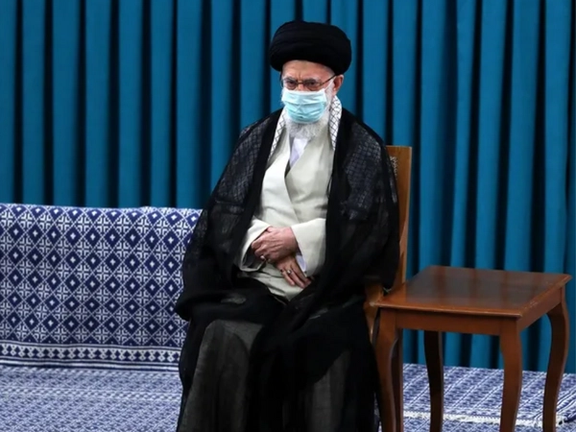
Iran’s Supreme Leader Ali Khamenei in a speech on Sunday did not mention nuclear talks with the West and focused on Islamic unity and anti-American statements.
Khamenei who was speaking on Prophet Mohammed’s birthday to participants at a recent Islamic unity conference sponsored by Tehran, said that the Americans try to divide Sunnis and Shiites by highlighting their differences, while they are in fact against Islam.
He went on to accuse the United States of sawing discord among Muslims and alleged that recent terror attacks in Afghanistan was sponsored by Washington through the Islamic State group. Iran’s anti-Western leader claimed that the US has acknowledged that they are the ones who have created the extremist Islamic group.
Khamenei also argued that Islam is a “collective and not an individual religion”. He said that secular powers try to portray Islam as a religion for the individual, his beliefs and his conscience. They try to present Islam as a religion at the individual level, while it is in fact a religion pursuing social issues and fundamental human problems, he said.
Khamenei also underlined that Palestine is the most important factor for Islamic unity and criticized Arab countries that have established relations with Israel since 2020.
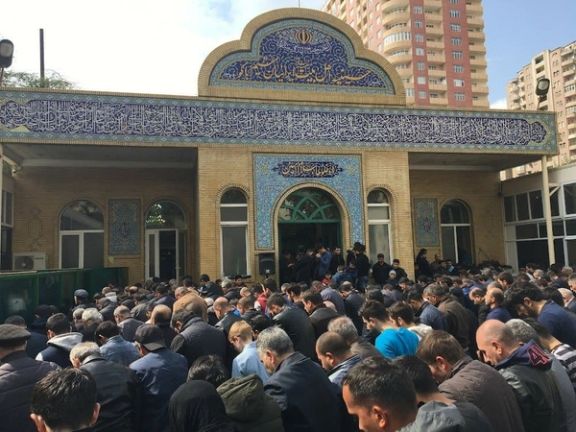
Azerbaijan's government has blocked Shia websites it says "engaged in Iranian and religious propaganda," following weeks of tensions between the two neighbors.
Tensions between Tehran and Baku, pumped up by media outlets, had appeared to ease since a phone-call between foreign ministers Hossein Amir-Abdollahian and Jeyhun Bayramov on October 13 and this week’s release of two Iranian truck drivers arrested on a transit road.
But Azerbaijani media reported Saturday that six websites − Deyerler (Values), Maide (Blessings), Ahlibeyt (Prophet's Household), Ehlibēt (also Prophet's Household), Shia and Islaminsesi (Voice of Islam) − had been blocked. Baku has not made an official announcement.
Deyerler is edited by Ilgar Ibrahimoglu, the previous imam of Baku's main Friday Mosque. The well-known and openly pro-Iranian imam also heads Defense of Freedom of Religion and Conscience, a non-governmental organization.
The website of the Stockholm-based Aznews (ANT) Television, which supports unity between Azerbaijan and the Azeri area of Iran it calls ‘South Azerbaijan,’ reported that Youtube channels carrying Iranian religious programs had also been blocked.
The Aznews website said Iran was breeding “terrorist groups in various countries under the guise of religion and religious sects to further its ideology.”
The relationship between Baku and Tehran has been fraught since last year’s war between Armenia and Azerbaijan, with Tehran uneasy over Azerbaijan’s territorial gains, Baku’s reported military relationship with Israel, and the alleged presence of Sunni militants shipped in from Syria by Turkey. Both Iran and Azerbaijan have recently carried out military maneuvers near the border.
Baku continues to detain four clerics who are members of the Assembly of Clergy of Azerbaijan and who were arrested last month, although it has released Ibrahimoglu, arrested at the same time.
On October 5 the Iranian embassy in Baku said Azerbaijani police had inspected an Iranian mosque in Baku, Iranian Husseiniya, and shut it down. The mosque, which is affiliated to the Iranian embassy, houses the office of Ali-Akbar Ojaghnejad, representative in Azerbaijan of Iranian leader Ali Khamenei.
The Iranian ambassador, Seyed-Abbas Mousavi, later said that the closure had not affected Ojaghnejad’s work, which is conducted in the same building. According to Azeri media, Ojaghnejad has returned to Tehran.
Azerbaijan, which has a population of around 10 million, is majority Shia but religious beliefs waned under decades of Soviet rule. While President Ilham Aliyev comes from a Sunni background, 49 percent of Azerbaijanis surveyed in 2010 by Gallup said religion was not an important part of daily life.
Last year’s war with Armenia stimulated Azeri nationalist sentiment both in terms of affinity with fellow Azaris in Iran, where they make up around 25 percent of the population, and with fellow Turkic peoples stretching from Turkey to the central Asian republics.
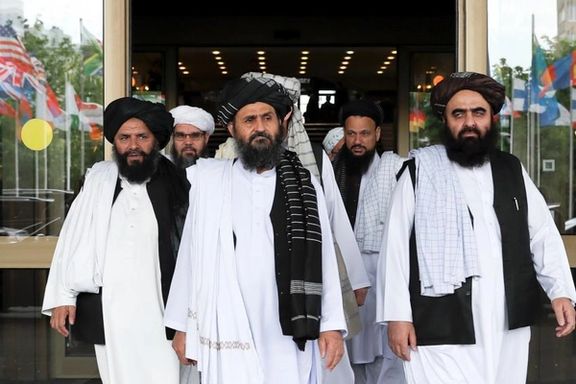
A top Iranian conservative paper has attacked potential recognition of Afghanistan’s Taliban government as "worse than a strategic mistake" and “dishonorable".
Jomhuri Eslami (Islamic Republic), one of Iran’s oldest newspapers, in a commentary Saturday suggested Tehran had decided to join Russia in recognizing the Taliban’s ‘Islamic Emirate of Afghanistan’ despite the group’s history of ‘terrorism’ and religious intolerance.
Russia has suggested it would recognize the Taliban if it met several conditions, including forming an ‘inclusive’ government and giving guarantees over human rights. Russia, and other states including China, have held off a decision while keeping diplomatic contact, much as the United States did in reaching its 2020 agreement with the Taliban over US military withdrawal.
The 2020 US-Taliban agreement saw the Taliban commit not to allow operations by militant Sunni groups like the Islamic State (Isis-Daesh). Tehran is likewise concerned over possible infiltration by Sunni militants, especially those linked to Isis and Baluchi separatists.
In a joint statement issued October 20, Russia, China, Iran, India, Pakistan and four central Asia republics – following a meeting of the ‘Moscow Format Consultations on Afghanistan’ established in 2017 – issued a statement viewing the Taliban as the new rulers "irrespective of the official recognition of the new Afghan government by the international community."
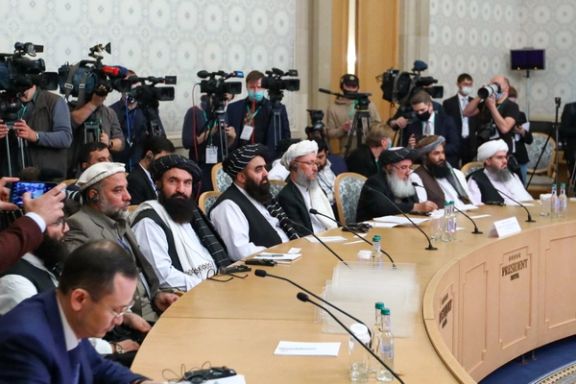
Reflecting disquiet in Tehran, a senior official in the Iranian foreign minister criticized "Russia's weak handling"of the Moscow Format talks and suggested the joint statement had not been agreed.
Jomhuri Eslami, which has resisted those in Iran arguing Tehran must deal with Taliban whether it wants to or not, in its commentary Saturday argued the Taliban would eliminate Persian as an official language and remove Shia religious jurisprudence from law, and that it was forcibly evicting Shiite Hazaras from their lands and denying women the chance to study and work. All this, the paper argued, showed the Taliban was not "worthy of recognition."
For Iran, which considers itself the leader of the Shiite world, the suppression of Afghan Shiites is anathema. Human Rights Watch (HRW) this week said that since taking Kabul in August, the Taliban had forcibly evicted thousands of Afghans from their lands.
Sunni-Shia war?
Last week Taliban Spokesman Zabihullah Mujahid expressed hope in an interview with Iran's Hamshahri newspaper that Tehran would soon recognize the Islamic Emirate of Afghanistan. Mujahid said the new rulers in Kabul had good relations with Iran, shared interests in trade and security, and was receiving “Iranian delegations.” He dismissed as propaganda reports of discrimination against Afghanistan's Shiite minority including the Hazaras.
Nour News, a website close to Supreme National Security Council Secretary Ali Shamkhani, in a commentary Wednesday said that "acting on the United States' behalf," Isis was trying to discredit Taliban declarations over security, entice a negative reaction from Iran, and fuel a Sunni-Shia war.
Nour cited the recent bombings at Shia mosques in Kunduz and Kandahar, killing at least 90 people, as evidence that Isis aimed at “heightening insecurities and causing ethno-religious conflicts.” Nour called on the Taliban “as promised” to offer support to Shiites taking on security for themselves.
Iran will host its own meeting of foreign ministers of Afghanistan's neighbors in Tehran October 27 and has invited Russia. Khairullah Khairkhwa, the Afghan minister of information, said Thursday that Kabul had yet not decided whether to attend.
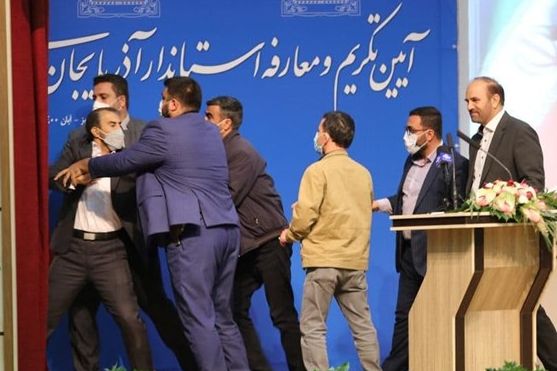
A former IRGC provincial commander who was recently appointed as governor was slapped by another military officer during his inauguration ceremony on Saturday.
Abedin Khorram who earlier this week was appointed as Governor of East Azerbaijan Province was slapped by “a member of the armed forces” in the presence of Interior Minister Ahmad Vahidi, according to Fars news agency affiliated with the Revolutionary Guard.
Fars, without naming the individual, said that he had a personal issue with Khorram, who offered another explanation to the state television.
The new governor said that the person who slapped him was angry because “a man [not a woman] had administered his wife’s Covid-19 vaccine”. According to Islamic rules, opposite sexes who are not immediate family members should not touch one another.
Khorram was asked how the person was able to enter the inauguration venue. He replied that obviously there was lapse of security and officials will investigate that.
Iran’s President Ebrahim Raisi (Raeesi) has appointed many IRGC officers in top positions, which has led to criticism by many. Khorram was commander of Revolutionary Guards in the same province until he was appointed governor.